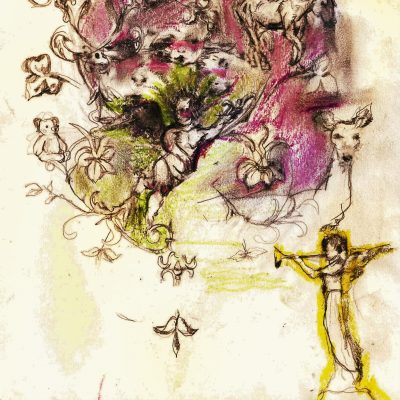
I first stumbled upon Mali Velasquez by chance, taken in by her album art. It was a painting of three figures, two adults and a child between them, coloured in the yellows, pinks, and browns of an old family photograph. When I pressed play the song that followed felt like a continuation of the image, the shaking and half shattered lines, the pinks and purples or warm guitar, Melasquez’s voice both familiar and foreign as it breaks and returns. When I learnt that she’d painted the album art herself it all fell into place. Here was something special.
There’s no filler song in I’m Green; each track could triumph as a standalone single; delicately thought out, rich with meaning and shining guitar. Take ‘Turn Red’, which details with fraught tenderness an unexpected drive to hospital; ‘Bust open through your stitches, Now you’re gushing blood, I drive you to the ER, But don’t feel old enough’. There’s a visceral sense of new adulthood here, of a fragility which Velasquez also embeds elsewhere in the song. It can be felt quite clearly in the bird calls which frame the track, a sonic signal of new life, of ‘green’. It’s subtle detail like this that only someone in total command of their artistic vision could pull off, and Velasquez does so with ease, again and again and again.
The album takes on new meaning when we learn that it navigates the relationship of Velasquez to her mother, who died while she was in high school. However, this isn’t quite what I’m Green is about. Rather, it’s about Melasquez’s longest relationship to date – the relationship she has with herself.
‘Tore’ in particular seems like a deep uncovering of self, ‘And you could see right through me, But said that I’m not being transparent’. Rooted in thick fuzzy guitar, prodded by the tick-tock of a drum beat that conjures images of mantelpiece clocks in the family living rooms, Velasquez is opening her home, flipping through the family photo album, painting deeply discomforting moments in the blithe and effortless way that she does so well; ‘the grass that I hid all of my throwing up in’. Around the middle the song stumbles, unravels, catches itself, reforms, sings with distorted guitar and then shatters into nothing. It’s these deeply organic and unexpected structural turns that make Velasquez’s music so arresting – they truly feel organic, fleeting, as if they could shudder and disappear.
‘Shove’ is another great song in terms of pacing, it has a vigorousness and pumping life that defies form. Lyrically, Velasquez has the uncanny ability to twist the mundane into something poetic. ‘Did I bite a hole in your neck and drain you dry? Do we still wake up every morning at the same time?’ Her words bridge the gap between the mystical and the everyday, taking universal experiences and de-familiarising them, so that life suddenly becomes something foreign and special. Perhaps it’s the way that we experience the world in our early twenties, when buying our own groceries or walking the city at night feels like stepping into the precipice of adulthood, like the start of a new world.
At the centre of this album, behind the beautiful production work of Josef Kuhn and the layers of guitar and synthesiser, is Velasquez’s voice. It has a wavering quality, a strange ability to stop and start in the span of a single note, like a minute catching of the breath. It’s a voice well fitted to carrying the emotional material that composes this album, a load that Velasquez carries with an intense maturity well beyond her years. This album is one of my favourites of this year, and Velasquez is certainly only at the very beginning of a hugely important career.
